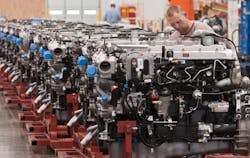EPA: Engine fines needed to keep Navistar running
The debate over using EGR (Exhaust Gas Recirculation) vs. SCR (Selective Catalytic Reduction) technologies on diesel engines to meet federal emission limits is far from over and indeed has just heated up considerably in court filings.
Responding in a legal brief to a lawsuit filed against it by Volvo Group North America, Daimler AG and Cummins Inc. for allowing Navistar International to pay fines on its noncompliant engines, the Environmental Protection Agency said that had it not imposed the fines, Navistar "might be forced from the marketplace."
EPA said in its defense of allowing the fines that Navistar’s inability to comply with the EPA ’10 emission rules exposed both its customers and employees to “serious harm,” as was pointed out in detailed Dow Jones Newswire report on the case posted online today. Navistar has been paying about $1,900 per noncompliant heavy-duty engine.
Before the fines began to be levied, Navistar had been using “pollution credits” to meet the EPA ’10 limits. However, EPA had alerted Navistar that it would run out of those credits by February. "Substantial work was required to meet the current [nitrogen oxide] standard and Navistar was a "technological laggard," stated EPA in its brief.
What’s more, the agency contended that were the fines not allowed, Navistar "might be forced from the marketplace."
Indeed, as reported by Dow Jones, EPA “projected that production of Navistar's heavy-duty trucks and engines would be suspended for months while the company's engines were evaluated and certified by the EPA.
The agency estimated the production outage would cost the company at least $3 billion, more than 30% of its annual revenue. Meanwhile, nearly 4,000 Navistar workers engaged in building trucks and engines would be idled. Suppliers of parts and customers with trucks on order would be affected as well.”
The February suit filed by Cummins, Daimler and Volvo accused EPA of disregarding its own rules and thus benefitting Navistar. The claimants want the federal appeals court in Washington, DC, to overturn the fines and require EPA to conduct public hearings before reinstating the fines.
In a federal court filing, the Dow Jones report noted, Navistar “described its rivals' complaints as ‘a greedy play’ for market share at Navistar's expense.”
What remains unknown at this point is how close Navistar is to having any of its engines certified to the EPA ’10 nitrogen-oxide standard.
Also up in the air is what Navistar’s competitors would have done—or been able to do-- to immediately serve those customers who would have been left without an engine/truck supplier had Navistar indeed been “forced from the marketplace.”
Seeking answers to those questions, FleetOwner contacted Navistar, Cummins, Daimler and Volvo.
A Navistar spokesperson told FleetOwner that the company’s brief filed in supportof EPA’s decision to issue the NCP (Non-Conformance Penalties) “emergency rule” states the following: ““Navistar has taken the environmentally superior but technology tougher path to achieving .2 certification with our advanced EGR solution. The advanced EGR path was and remains a significant, time-consuming, and capital-intensive proposition. Since 2001, Navistar has devoted tens of thousands of hours and invested approximately $700 million in the development of its clean-burning, in-cylinder solution.”
Volvo Group spokesperson John Mies told FleetOwner that what the company has been arguing for is “a level playing field. We hope that we’ve impressed on the court that Navistar is not a technological laggard, and that NCPs are therefore not appropriate. Even if they were, the maximum of $1,900 is grossly insufficient. And beyond this, the EPA failed to adhere to its own prior practices, and the provisions of the Clean Air Act, in making its determination.”
Daimler responded to FleetOwner by pointing out that its posted “Comment Submitted by Daimler Trucks North America LLC and Detroit Diesel Corp.” regarding the EPA’s proposed rule for Nonconformance Penalties for On-highway Heavy-Duty Diesel Engines “provides our full background on the situation.”
Within 19 pages of comment, key points that the Daimler companies argue include their contention that EPA “has not met the legal criteria to issue NCPs” and that “Navistar faces a much easier task in implementing SCR technology now that its competitors have laid out the difficult groundwork, developing the technology, gearing up suppliers, and establishing the necessary DEF [diesel exhaust fluid] infrastructure required for an effective SCR solution.”
"NCPs must be set at a level that does not disadvantage those that invested and are meeting the standards," Carol Lavengood, director of marketing communications for Cummins Engine Business told FleetOwner. "The proposed NCPs do not achieve this goal as required by the Clean Air Act."
